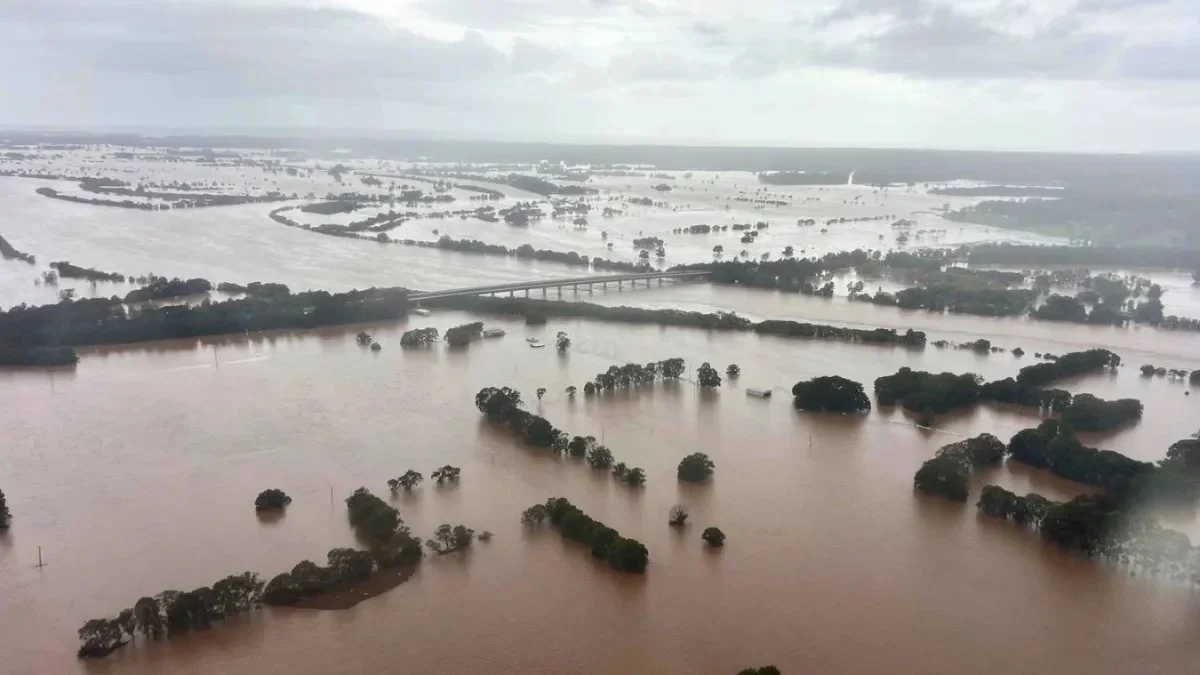Australia’s Climate Crisis and the Global Cost of Inaction
Flooding in around Taree, New South Wales on May 21, 2025. Credits: NSW-RFS
(May 26, 2025)
Based on stories from various sources (Australian Broadcasting Corporation, Al Jazeera, The Independent, etc.)
At least four people have died after record-breaking rainfall swept across parts of Australia's New South Wales state. Tens of thousands of people are isolated due to the floods. Authorities fear at least 10,000 homes and businesses impacted on the NSW Mid North Coast have been destroyed or seriously damaged as the flood clean-up begins.
... Much of the New South Wales Mid North Coast has been hammered by days of very intense rainfall. In the last 24 hours alone, people living in the area where I am say they’ve seen at least 250 mm of rain. That’s cutting off access for about 50,000 people who’ve been told to evacuate, and has prompted hundreds of rescues since the flooding began. The town of Taree is among the hardest hit – much of it remains under water due to a nearby river reaching its highest level ever recorded. Not far from where I am is a wildlife park that is mostly underwater.
“Shops have been flooded out, and they’ve only just got over the last flood, and it’s major damage this time, it’s a lot worse. So, that’s really bad.”
“It’s the worst we’ve ever seen,” Patch said. “It’s the worst everybody’s seen around this area.”
Australia has been hit with increasing extreme weather events that experts say are the result of climate change. After droughts and devastating bushfires, frequent floods have wreaked havoc since early 2021. The deadly floods that swept across New South Wales this week were intensified by the climate crisis, scientists said, even as tens of thousands of people remained cut off. Meteorologists have noted that the flooding was sparked by conditions that have grown more extreme due to rising global average temperatures. An analysis by ClimaMeter, a climate monitoring initiative, found weather patterns like those driving this week’s floods have become up to 15 percent wetter than in the past, largely due to the warming atmosphere.
The Climate Council, an Australian research group, also said that these kinds of disasters were no longer simply “natural.” The latest research for Australia showed more rain was falling during extreme events. “We’ve had back-to-back flood events since the 2019–20 fires,” said Andrew Gissing, chief executive of Natural Hazards Research Australia. “These are compounding events for communities still in recovery; it’s what we expect with people being in a constant state of disaster recovery under climate change.”
Meanwhile, Australia remains one of the world’s largest exporters of coal. While here in Canada all our governments seem to be moving to toss out environmental assessments and just give pipelines and coal and oil projects and more mines a constant ‘green light.’ As if Mother Nature can be thrown to the wolves with no consequences for us. Unfortunately, as someone said, Mother Nature always bats last ... and we are going to pay a very heavy price for our insatiable wanting of ‘more.’
It is time now, really, to start to cut back and use less. We can do that — we can use less and have a simpler lifestyle. And if we don’t, then only disaster awaits us, I think. And really, I think it is now too late to avoid a major disaster no matter what we do; but even so, we have to start to try to do better.
And to do that, it would be nice to have good and honest leadership. But instead, our governments in Canada have been taken over by the very people and corporations who are destroying our planet for profit. This is not a joke, folks, and the coming reality is not going to be pretty.
It IS time for some major changes — so let’s make them and start to move ahead toward a better future. It would be useful if everyone started to phone up their corrupt politicians and media and told them that.
We need this planet. We have nowhere else to go. So we have to stop poisoning it and destroying it. And the easiest way for us to do that is to simplify our lifestyles and force the corporations to slow down their manufacturing, and so on.
One first step can be public transit, bikes, and walking instead of cars.
Another easy step is to reduce the crazy level of ‘packaging’ in our stores and supermarkets. It’s just out of control and the planet cannot deal with it anymore. That’s why we all seem to have plastic in our brains now.
Do we think we can continue on this path to lunacy?
Or is it time for some major changes?
We shall see.
